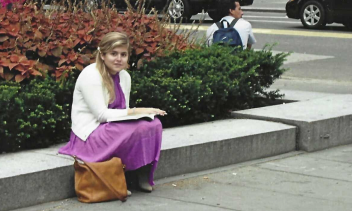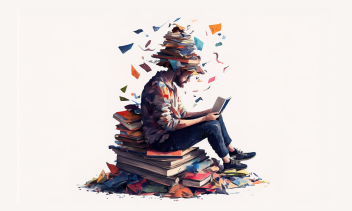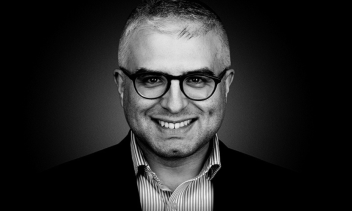I once read an essay in which the author said that “letters can express experience, numbers express objective truth.” You’ll have to guess who wrote that. I have an addition to make, though: Literature expresses emotions—what it is like to be alive.
When I was in high school, my father gave me a book called God Knows, by Joseph Heller, and said I would enjoy reading it. In short, the novel is a fictional memoir of King David, recounting his life as he nears the end of his days. After slogging through the first 50 pages, I gave up. I was bored and, worst of all, despite my long-time familiarity with these biblical characters, felt no connection with them. About a decade later, I picked it up again, and on one summer afternoon, cruising down the west side of New York City on the subway, I finally finished it. I was, without exaggeration, in visible tears. A fellow New Yorker asked if I was okay. I was in the throes of a simultaneous existential upending coupled with a rare kind of revelatory illumination, so naturally I responded with something clever like: “Yeah, this book was just, wow.” I have no recollection of what she said next. That is the power of a novel.
Fiction is designed to show us, not tell us, what it is that makes us human. When I pick up a non-fiction book, I have a tendency to know what I’m getting into. But I can’t even count how many times someone has suggested a novel to me and then, after giving just the briefest of hooks, says something like “I can’t really say what it’s about, just trust me, it’s really good.” So, I spend a hundred pages or so thinking why in the world am I reading this, then, as the final chapters approach, the anticipation begins to set in, and I hold on to every dear page left remaining until I close the book and wonder how I ever managed to get along beforehand. This is the great magic trick of a novel. I come for the premise, but what gets me to finish is that I find myself so invested in the struggles these characters face that I join them on their journey as they figure out how to overcome their own frailties and achieve their goals. But how in the world did this happen? I used to be a rational person. Why do I care whether Frodo destroys the ring or Harry defeats Voldemort? Whether Elizabeth Bennet and Mr. Darcy fall in love, or Atticus Finch wins the case?
I can’t answer this question for you. But I’ll tell you how I understand it. If these fictional heroes can overcome their struggles, both the ones they face from external villainous forces as well as the demons they discover hiding internally within themselves, then maybe I can too. Reading fiction has taught me that we are far more than the sum of our lived experiences. To paraphrase David Foster Wallace, we are part of a shared universe—that while I am the protagonist of my story, you are also the protagonist of yours. Our adventures crossover in some chapters, and in others we go out on our own, together writing a series of books and novels that make up our lives and the history of humanity.
That’s where storytelling comes in—to tell the truth, the human truth, when the facts alone aren’t enough.
One of the last essays I ever wrote in college was titled “You are what you Drive: Cars and the Zombie Apocalypse.” Essentially, I explored how the protagonist’s deteriorating mental state in I Am Legend was symbolized by his car slowly losing its essential mechanical functions. Now, my thesis could be easily dismissed as the work of an over-thinking undergraduate literature major. Yet, I truly believe there is that underlying symbolism in the text. When our hero finds himself alone in the zombie apocalypse, so very alone and overwhelmed that even his car is starting to suffer the effects of isolation, the hope, I think, is that the reader might better understand what it is like to be truly alone. Of course, we all already know that it is terrible to be alone. But, when an author utilizes all the tools that the medium of fiction affords, a novel can express the depths of the human experience with a unique power. These literary devices—symbols, motifs, character arcs, metaphors, even the very form of the work itself—all come together to convey to the reader more than just information. It is the language to express the ineffable experience of being alive.
I’ve utilized these same tools in my professional life as an attorney working with victims of domestic violence. When it comes to trial, we always ask the same question – how do we tell this survivor’s story? While the facts are the facts, and as harrowing or compelling as they might be, an opening statement always needs something more. It needs an emotional hook to connect the jurors with the survivor. Something that allows the jurors to look at the survivor and see themselves reflected back.
Fiction taught me how to accomplish this effectively. How to do more than simply organize events sequentially. That is the non-fiction approach— to just describe the facts, retell the plot, transmit information. It is, of course, immensely valuable in expressing material truths about the world. But it can never express human truths, what it feels like to be alive and to experience all its pleasures and torments. That’s where storytelling comes in—to tell the truth, the human truth, when the facts alone aren’t enough. To communicate not just intellectually, but also emotionally.
I’d like to leave you with that idea. There are countless examples of novels that have softened my soul, and not enough words left in my word count to describe them all. Fiction expresses the breadth of human experiences and helped me develop emotional rationality. Logical rationality helps us think clearly through ideas we have never engaged with before, emotional rationality helps us feel things about life’s experiences that we have never encountered before. To connect with others who don’t look like me, or believe what I believe, or have the same political ideas as I do, and to find the common humanity of us all. I’ve read books about aging, love, friendship, marital strife, authoritarianism, maturation, loss of innocence, desperation, longing, and so much more. Many things I have encountered in my own life, but many more that I have yet to see, and many others that I never will.
Reading, of course, is not a substitute for actual life.
But isn’t it comforting to understand, and to be understood, even with the distance of ink in between?
Aharon Schrieber is a reader of many books and writer of many unproduced screenplays. He is currently an attorney in New York City, where he provides legal services to survivors of domestic violence. He is also a graduate of Hunter College, where he studied English Literature. To chat about fiction, he can be reached on Twitter @baronaharon. Aharon dedicated this essay to Professor Alison Rogers and Professor Sarah Davis.








